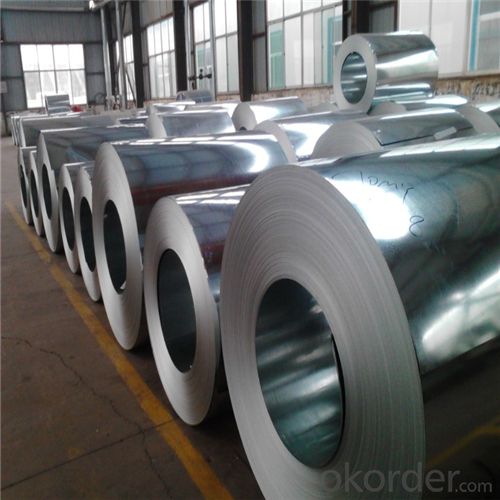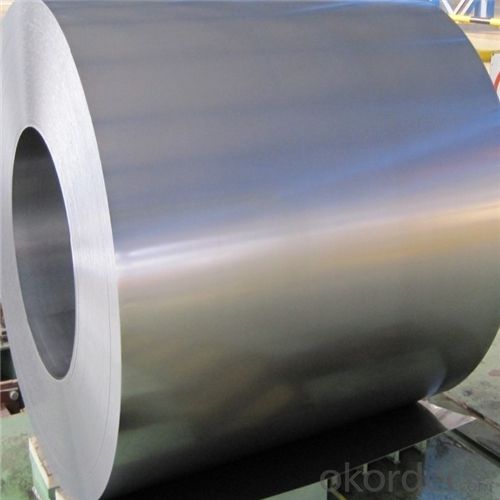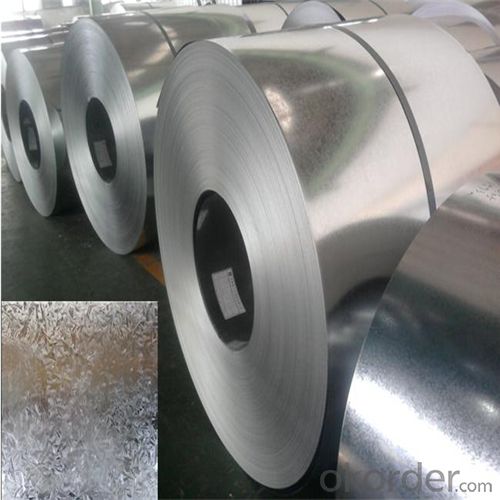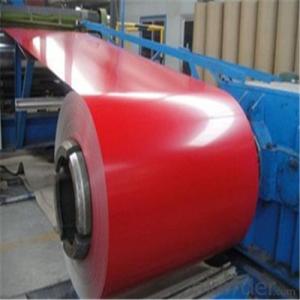Hot-Dip Galvanized Steel Coil Used for Industry with So Much Good Quality
- Loading Port:
- Tianjin
- Payment Terms:
- TT OR LC
- Min Order Qty:
- 25 m.t.
- Supply Capability:
- 5000 m.t./month
OKorder Service Pledge
OKorder Financial Service
You Might Also Like
Hot-Dip Galvanized Steel Coil Used for Industry
1.Structure of Hot-Dip Galvanized Steel Coil Description
Hot-dip galvanized steel coils are available with a pure zinc coating through the hot-dip galvanizing process. It offers the economy, strength and formability of steel combined with the corrosion resistance of zinc. The hot-dip process is the process by which steel gets coated in layers of zinc to protect against rust. It is especially useful countless outdoor and industrial applications.
2.Main Features of the Hot-Dip Galvanized Steel Coil
•High Purity
•Easy control and operation
•High strength
•Fast melting
•Competitive price
•Best Service
3. Hot-Dip Galvanized Steel Coil Images



4. Hot-Dip Galvanized Steel Coil Specification
Hot-Dip Galvanized Steel Coil | |
Thicknenss | 0.10mm-5.00mm |
Width | 2000mm max |
Coating mass | 30-600g/㎡ |
Spangle | Regular/Minimized/Zero Spangle |
Coil inner diameter | 508-610mm |
Surface treatment | Chromated/non chromated, Oiled/non oiled, Anti finger print |
5.FAQ of Hot-Dip Galvanized Steel Coil
We have organized several common questions for our clients,may help you sincerely:
①How about your company?
A world class manufacturer & supplier of castings forging in carbon steel and alloy steel,is one of the large-scale professional investment casting production bases in China
②How to guarantee the quality of the products?
We have established the international advanced quality management system,every link from raw material to final product we have strict quality test;We resolutely put an end to unqualified products flowing into the market. At the same time, we will provide necessary follow-up service assurance.
- Q:can anyone help me to find any webpage about lists/types of stainless steel?
- Types of stainless steel There are over 150 grades of stainless steel, of which fifteen are most common. The AISI (American Iron and Steel Institute) defines the following grades among others: - 200 Series—austenitic iron-chromium-nickel-manganese alloys - 300 Series—austenitic iron-chromium-nickel alloys Type 301—highly ductile, for formed products. Also hardens rapidly during mechanical working. Type 303—free machining version of 304 via addition of sulfur Type 304—the most common; the classic 18/8 stainless steel Type 316—Alloy addition of molybdenum to prevent specific forms of corrosion - 400 Series—ferritic and martensitic alloys.
- Q:what is the differance between ceramic and stainless steel headers and 4-2-1 and 4-1 and which are better for racing and should i get ceramic or stainless steel headers???? for a 98 civic
- This Site Might Help You. RE: ceramic vs stainless steel headers HELP!!!!!!!!!!!!!! for a 98 civic? what is the differance between ceramic and stainless steel headers and 4-2-1 and 4-1 and which are better for racing and should i get ceramic or stainless steel headers?? for a 98 civic
- Q:How do steel coils contribute to energy efficiency in lighting?
- Steel coils do not directly contribute to energy efficiency in lighting. Steel coils are typically used in the manufacturing of various electrical and electronic appliances, including lighting fixtures. However, the energy efficiency in lighting primarily depends on the type of light source used. The energy efficiency of lighting is typically determined by the type of light bulb or fixture used, such as incandescent, fluorescent, LED, or halogen. Each of these light sources has different energy consumption characteristics. Steel coils, on the other hand, are primarily used for structural support, heat dissipation, and protection in lighting fixtures. They are not directly involved in the energy efficiency of the lighting system. However, steel coils can indirectly contribute to energy efficiency in lighting by providing strong and durable support to the lighting fixtures. This allows for reliable and long-lasting installations, minimizing the need for frequent maintenance and replacements. A well-supported lighting system ensures optimal performance and reduces any energy wastage or inefficiencies that may arise from loose or unstable fixtures. Additionally, steel coils can also be utilized in the manufacturing of reflectors or housings for lighting fixtures, which can help enhance the overall efficiency and distribution of light. By effectively reflecting and directing the light output, the utilization of energy and illumination can be optimized, reducing any potential energy waste. While steel coils themselves do not directly impact the energy efficiency of lighting, their use in the construction and support of lighting fixtures can indirectly contribute to a more energy-efficient lighting system.
- Q:I heard that titanium isn't the most hypoallergenic metal because it is treated and the chemicals can cause an allergic reaction. I also heard that surgical steel is the best because it is what is used in surgery and in hip replacement implants etc. Is this correct?I've always heard that titanium is best, but now I'm curious because surgical steel is much cheaper than titanium which can be expensive.Thanks
- Implant grade titanium is much better than surgical steel. The nickel content in it (which is what alot of people are allergic to) is virtually non-existant. Though most people with a nickel allergy are fine with surgical steel too, its too small for most people to react to. But the odd few people do. Its the same with everything. Good surgical steel is probably better than cheap titanium. But implant grade ti will beat it hands down. And ti is alot stronger, and is also used in surgical impants and as replacement bits too. But a big lump of titanium hip is going to be expensive. If you're not allergic to steel, theres little reason for the extra cost, especially if it's likely to outlive you. Niobium has no nickel in at all. But that really is expensive, and I've never seen any threaded. Any particular reason why you ask? ----- Piercing-wise titanium will be better than steel. Unless they carry some not so great ti. You should be fine with steel though.
- Q:How do steel coils perform in corrosive environments?
- Steel coils typically perform well in corrosive environments due to their inherent resistance to corrosion. This is primarily because steel is an alloy composed of iron and other elements, such as carbon, which provides it with a protective layer known as a passive film. This passive film acts as a barrier between the steel surface and the corrosive elements, preventing direct contact and thus minimizing the risk of corrosion. In addition to the passive film, steel coils can also be coated with various protective coatings to enhance their resistance against corrosion. These coatings, such as zinc or epoxy, provide an additional layer of protection and further extend the lifespan of the steel coils when exposed to corrosive environments. However, it is important to note that the performance of steel coils in corrosive environments can still be influenced by factors such as the specific corrosive agent, exposure duration, and the presence of other contaminants. In highly aggressive environments, such as those with high humidity, saltwater exposure, or acidic chemicals, the protective layers on steel coils may deteriorate over time, leading to potential corrosion. To ensure optimal performance in corrosive environments, it is advisable to select steel coils with corrosion-resistant properties, such as stainless steel or galvanized steel. Regular maintenance and inspections are also crucial to identify any signs of corrosion early on and take appropriate measures to prevent further damage. Overall, steel coils offer good resistance to corrosion in most environments, but the severity of the corrosive conditions can ultimately impact their performance.
- Q:I work in a steel foundry 10-12 hours a day where we melt and pour stainless steel tubes. The pour temperature for some of them is very close to the boiling point of stainless steel (about 3800 degrees) because it has to be VERY liquid for the application we use it. Anyway, it does boil a little and we breath in the vapours which I can assure you ARE indeed vapourized stainless steel (it collects and cools on everything and makes a nice shiny coating). Ok, so to the question, does breathing vapourized stainless steel all day pose a health risk such as cancer? Anyone know? I'm just curious.
- you okorder
- Q:Which movie is better and why?I say Man of Steel!
- Captain America: The First Avenger -- Mostly because it was a rousing, entertaining, old-school adventure film, plus it was true to the character of Steve Rogers/Captain America. Man of Steel, IMO, had a poor script, tinkered way too much with one of the great superhero origin stories and was not at all true to the character. Historically Superman has always been a symbol of heroism, proud, strong, beaming. But what we got in that movie was an utterly cheerless, dour automaton devoid of any kind of charisma or presence. I don't know who that boring, depressed dude who looked like Superman was in that movie, but he most certainly wasn't Superman.
- Q:How are steel coils processed for slitting or edge conditioning?
- Steel coils are typically processed for slitting or edge conditioning through a series of steps. First, the coils are uncoiled and inspected for any defects or damages. They are then leveled and straightened to ensure a uniform thickness and flatness. Next, the steel is fed through a slitting machine, which uses rotating circular blades to cut the coil into narrower strips. These strips can be further processed for edge conditioning, where the edges are trimmed or profiled to meet specific customer requirements. This can be done through various methods such as shearing, deburring, or edge rolling. Overall, the process involves precision cutting and shaping techniques to transform the steel coils into desired slitted or edge-conditioned products.
- Q:What are the typical tolerances for steel coils?
- The typical tolerances for steel coils can vary depending on the specific requirements and standards of the industry. However, common tolerances for steel coils typically range between +/- 0.005 to 0.020 inches in terms of thickness, width, and length. These tolerances ensure that the steel coils meet the desired specifications and can be used effectively in various applications.
- Q:How are steel coils inspected for surface quality?
- Steel coils are inspected for surface quality through a visual examination process, where trained inspectors closely examine the surface of the coils for any defects or irregularities. This includes looking for scratches, dents, stains, or any other imperfections that may affect the quality of the steel. Additionally, advanced technologies such as automated scanning systems or cameras may also be used to detect and analyze any surface defects that are not easily visible to the naked eye.
1. Manufacturer Overview |
|
|---|---|
| Location | |
| Year Established | |
| Annual Output Value | |
| Main Markets | |
| Company Certifications | |
2. Manufacturer Certificates |
|
|---|---|
| a) Certification Name | |
| Range | |
| Reference | |
| Validity Period | |
3. Manufacturer Capability |
|
|---|---|
| a)Trade Capacity | |
| Nearest Port | |
| Export Percentage | |
| No.of Employees in Trade Department | |
| Language Spoken: | |
| b)Factory Information | |
| Factory Size: | |
| No. of Production Lines | |
| Contract Manufacturing | |
| Product Price Range | |
Send your message to us
Hot-Dip Galvanized Steel Coil Used for Industry with So Much Good Quality
- Loading Port:
- Tianjin
- Payment Terms:
- TT OR LC
- Min Order Qty:
- 25 m.t.
- Supply Capability:
- 5000 m.t./month
OKorder Service Pledge
OKorder Financial Service
Similar products
New products
Hot products
Related keywords





























